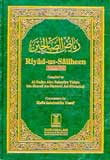Riyad Us-Saliheen (Gardens of the Righteous)

Chapter 364
Prohibition of using Utensils made of Gold and Silver
1795. Umm Salamah (May Allah be pleased with her) said: The Messenger of Allah (PBUH) said, "Whosoever drinks in utensils of silver, in fact, kindles in his belly the fire of Hell.''
[Al-Bukhari and Muslim].
The narration of Muslim is: "Verily, the person who eats or drinks in utensils made of gold and silver.''
1796. Hudhaifah (May Allah be pleased with him) reported: The Prophet (PBUH) prohibited us from wearing silk or Dibaj and from drinking out of gold and silver vessels and said, "These are meant for them (non-Muslims) in this world and for you in the Hereafter.''
In another narration Hudhaifah (May Allah be pleased with him) said: The Messenger of Allah (PBUH) said, "Do not wear silk and Dibaj, nor eat or drink from utensils made of gold and silver.''
[Al-Bukhari and Muslim].
Commentary: Dibaj is a kind of silk. Some say that thick silk is called Dibaj. Others say that it is the type of cloth in which some of the lengthwise and breadthwise threads are of pure silk, while the rest of the cloth is made of cotton.
1797. Anas bin Sirin (May Allah be pleased with him) said: I was with Anas bin Malik (May Allah be pleased with him) in the company of some Magians when Faludhaj (a sweet made of flour and honey) was brought in a silver utensil, and Anas did not take it. The man was told to change the utensil. So he changed the utensil and when he brought it to Anas, he took it.
[Al-Baihaqi].
Commentary: From the above narrations, it is clear that the use of utensils made of gold or silver is forbidden in Islam for eating, drinking and for all other purposes. However, medical use of golden or silver wire is not forbidden, e.g., the use of golden wire in securing teeth, or fixing a tooth partly made of gold.
Eating and drinking in utensils of precious metals (in which platinum may also be included) is forbidden as it is a show of pride and exhibition of richness. All such actions are against the basic teachings of Islam. Precious metals should not be used for decoration either.
1. However, women may use precious metals as ornaments, since according to some narrations there is exemption for the fair sex in this matter. Still some scholars maintain that the chain of such narrations is weak, so they do not allow their use in the ornaments of women as well. Sheikh Al-Albani has discussed this matter in detail in Adab Az-Zafaf and he does not agree with the opinion of these other scholars.
2. Silken dress is also forbidden for men and, similarly all types of dresses resembling silk are forbidden for them, which are a speciality of women. They are forbidden as creating likeness and resemblance to women. The reason behind this is that the softness and delicacy found in silk is against manliness.
3. The prohibition of these things reflects the temperament and disposition of Islam. Islam encourages simplicity and piety in eating, drinking, dress and living; and forbids luxury and ease that creates resemblance and likeness with the disbelievers. Alas! Present-day Muslims have adopted ease and luxury and made it the criterion of nobility and are following in the footsteps of the disbelievers. Everyone is busy day and night to attain the western standard of living by hook or by crook. May Allah lead them on the Right Path.
